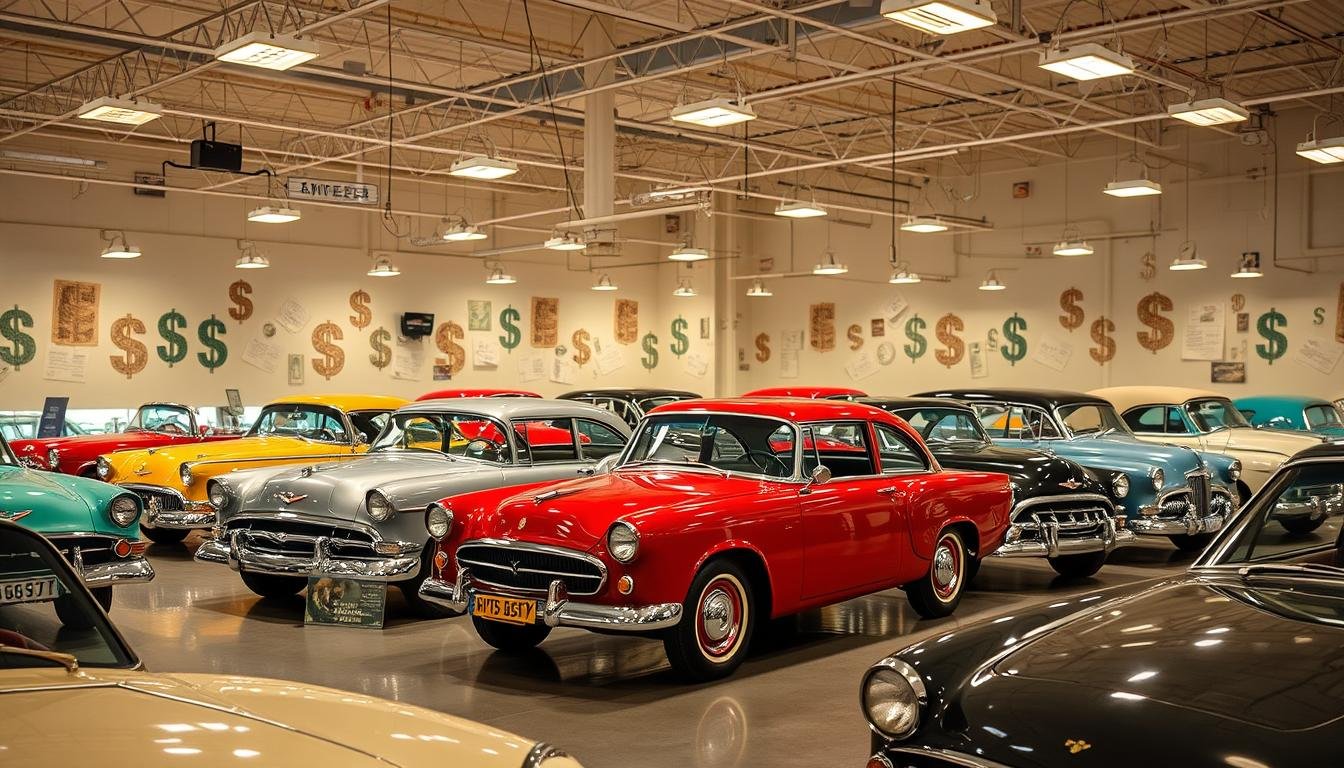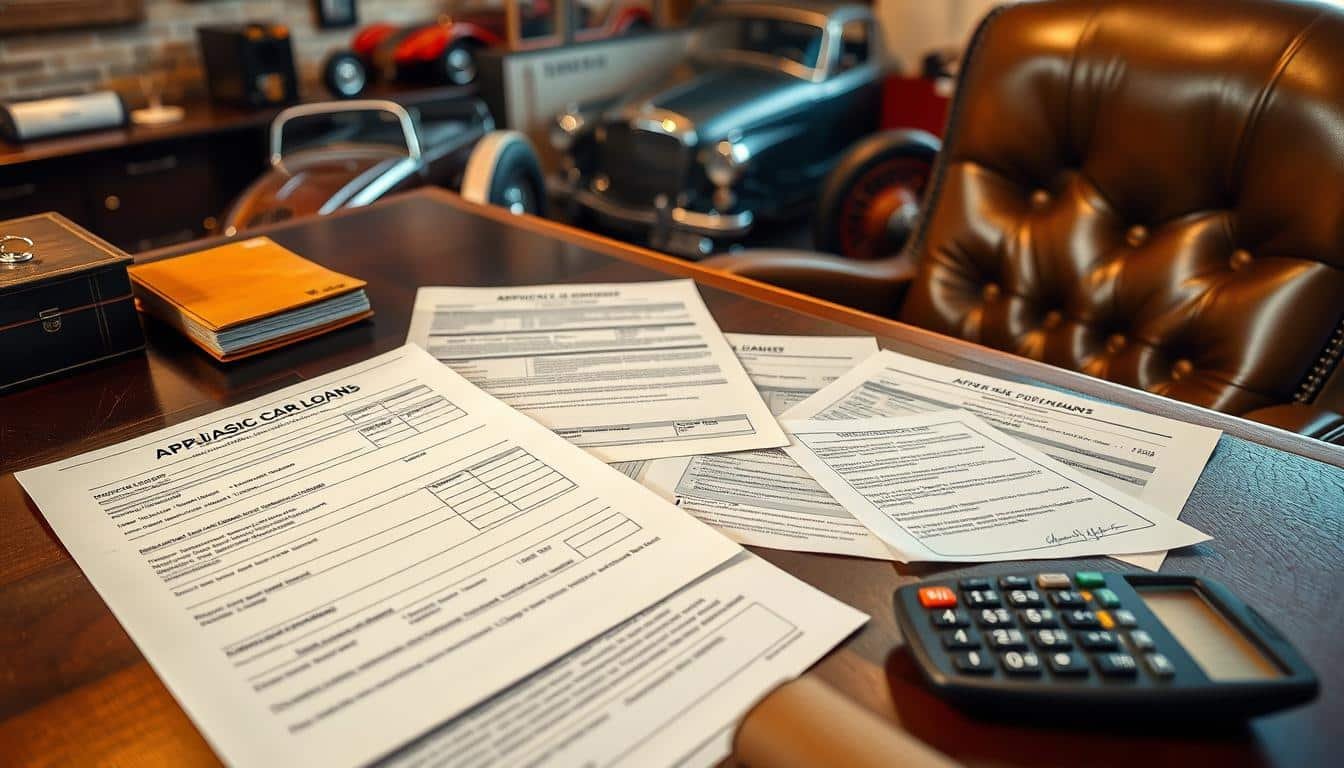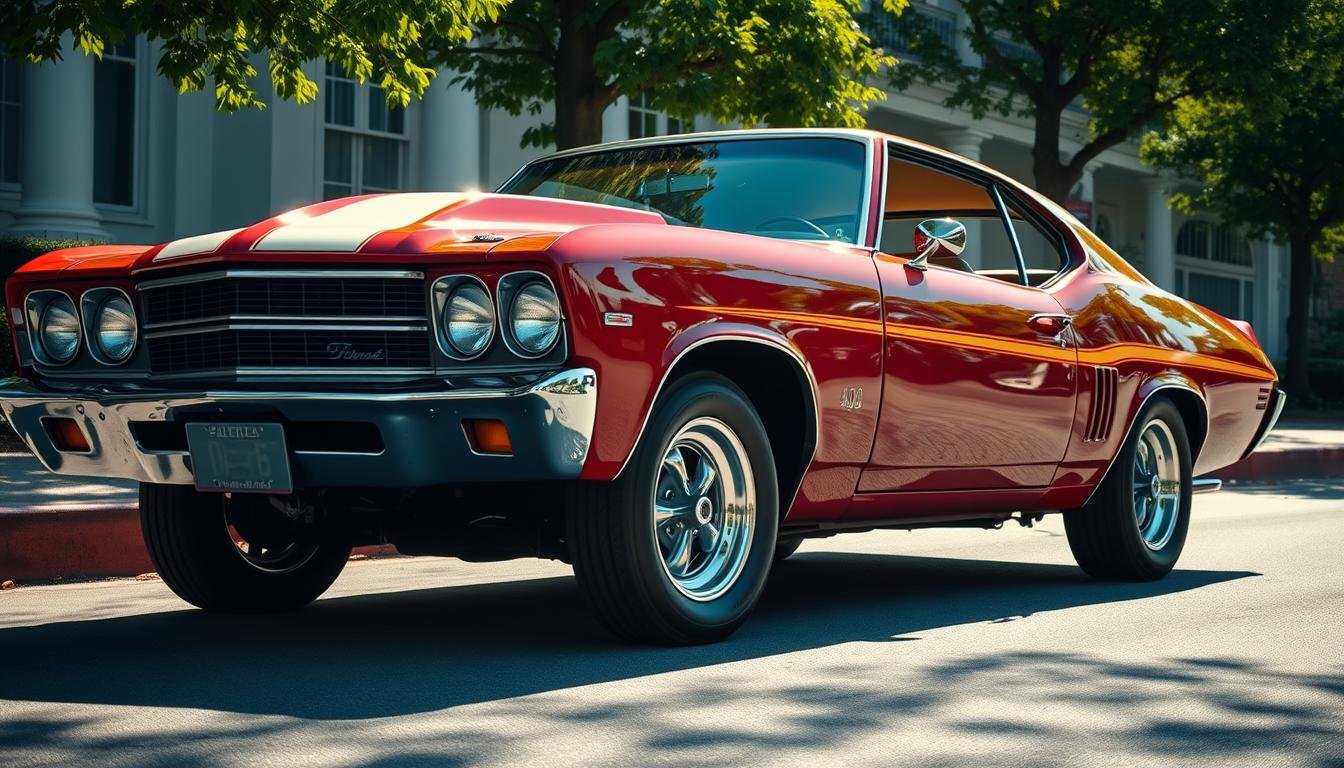Buying a classic car is exciting and rewarding. These cars hold sentimental value and can increase in value over time. But, getting a loan for a classic car is different from a regular car loan. You need lenders who know about these special vehicles.
Lenders look at the car’s age and if it meets certain criteria. Groups like the Antique Automobile Club of America set rules for what makes a car “classic.” They say a car must be at least 25 years old or made between 1915 and 1948.
Each lender has their own rules. For example, Collector Car Lending in Florida considers cars from 1928 to 1998 as “classic.” J.J. Best Banc & Co. in Massachusetts says cars from 1900 to 1985 are “classic.”
Key Takeaways
- Classic car loans have specialized requirements compared to standard auto loans
- Lenders consider the age and eligibility of the vehicle based on different industry definitions
- Credit scores, down payments, and specialized insurance are crucial factors in securing approval
- Vintage vehicle financing can be a good investment due to potential value appreciation
- Understanding the unique characteristics of classic cars is essential for lenders when evaluating loan applications
What Defines a Classic Car for Loan Purposes
Getting a loan for a classic car can be tricky. What makes a car “classic” can differ between groups and lenders. It’s key to know these differences if you want to finance your vintage vehicle.
Age Requirements by Different Organizations
The Antique Automobile Club of America says cars over 25 years old are classics. But, the Classic Car Club of America looks at cars from 1915 to 1948 as classics. Lenders also have their own rules. For example, Collector Car Lending goes for cars from 1928 to 1998, while J.J. Best Banc & Co. looks at cars from 1900 to 1985. Woodside Credit calls cars classic if they’re at least 25 years old.
Vehicle Eligibility Criteria for Financing
Lenders also look at the car’s maker and model for financing. The car’s rarity, uniqueness, and history matter a lot. These factors help lenders decide if they’ll finance your classic car.
Manufacturer and Model Considerations
Some cars are more popular among collectors and lenders. This makes them more likely to get classic car loans. The car’s production numbers, design, and cultural impact all add to its value and appeal.
Top Lenders Offering Classic Car Loan Options
Finding the right lender is key when buying a classic car. Luckily, many financial institutions focus on classic car lenders and collector car financing. They often have more flexible terms and can lend more money than regular auto lenders.
LightStream offers auto loans from $5,000 to $100,000 with no down payment or early payment fees. Collector Car Lending works with different credit scores and loans cars seven years or older. J.J. Best Banc & Co. has been a leader in specialty auto loans for decades, lending up to $2 million for rare classic cars.
Other great choices include DCU Banking, Star One Credit Union, and Woodside Credit. Woodside Credit has funded $3 billion in loans over 20 years, showing its deep knowledge in classic car financing.
When looking at classic car lenders, think about loan amounts, interest rates, and the lender’s knowledge of vintage cars. The right financing partner can make your classic car dreams come true.
“The team at J.J. Best Banc & Co. made the financing process for my 1963 Chevy Impala SS seamless. Their low rates and flexible terms allowed me to get the car I’ve always wanted.”
– John Smith, Classic Car Enthusiast
Essential Credit Requirements and Financial Preparation
Getting a loan for a classic car needs careful financial planning. You’ll need a good to excellent credit score, usually 660 or better. But, some lenders, like Collector Car Lending, might accept scores as low as 600.
Income checks and debt-to-income ratios are key for loan approval. Lenders look at your debt and financial health to see if you can pay on time. You’ll need to show detailed income proof when you apply.
Down payments for classic car loans vary by lender. Some, like J.J. Best Banc & Co., might ask for 10% to 20% of the car’s value. Before you apply, figure out how much you can afford to put down based on your finances.
Minimum Credit Score Requirements
Lenders usually want a credit score of 660 or higher for classic car loans. But, some, like Collector Car Lending, might accept scores as low as 600.
Income and Debt-to-Income Ratio Guidelines
Lenders check your income and debt-to-income ratio to make sure you can handle monthly payments. Be ready to provide detailed income documents when you apply.
Down Payment Expectations
Down payments for classic car loans can be 10% to 20% of the car’s value, depending on the lender. Think about your finances and decide on a down payment amount before you apply.
Types of Classic Car Financing Available

Financing a classic car offers several options. Traditional bank loans might not work for older or less perfect cars. Specialized lenders, like Woodside Credit, focus on classic, collector, and exotic cars. They offer more flexible terms and can finance cars that banks won’t.
Leasing is another choice for classic car fans. It can mean lower monthly payments. But, watch out for big payments at lease end. Personal loans are also an option, but they usually have higher interest rates than classic car loans.
Home equity loans can be good for classic cars, with lower rates and tax benefits. But, they’re risky because they use your home as collateral.
| Financing Option | Interest Rates | Loan Terms | Advantages | Disadvantages |
|---|---|---|---|---|
| Specialized Classic Car Loans | Starting around 6.25% | Up to 15 years, Loan amounts up to $1 million | Tailored to classic car needs, Flexible terms | May require higher down payments |
| Personal Loans | Higher than classic car loans | Typically capped at $5,000 | Easier to obtain for some | Higher interest rates, Lower loan amounts |
| Home Equity Loans | Lower than other options | Dependent on home equity | Lower interest rates, Potential tax benefits | Significant risk, Use home as collateral |
| Leasing | Varies by lease terms | Short-term, Flexible lease terms | Lower monthly payments, Option to switch cars | Potential balloon payments, No ownership |
Choosing the right financing is key. Work with lenders who get classic cars. They can offer solutions that fit your needs.
Understanding Interest Rates and Loan Terms

When you finance a classic car, interest rates and loan terms are key. Classic car loans often have higher rates than regular auto loans. This is because these cars are unique and harder to value. Rates can be as low as 4% or as high as 10% or more.
The loan terms for classic cars can be quite long. Some lenders offer up to 144 months, or 12 years. This makes it easier to afford these cars by spreading out payments. But, it’s important to think about the long-term costs of longer loans.
Payment Structure Options
Classic car financing offers different payment plans. Some lenders have balloon payments, where you pay most of the loan in one big payment. There are also lease-like options that end with a big “buyout” payment.
| Financing Option | Interest Rates | Loan Terms | Payment Structure |
|---|---|---|---|
| Classic Car Loans | 4% to 10%+ | Up to 144 months | Monthly payments, Balloon payments, Lease-like options |
| Personal Loans | Prime rate + 2-12% | Up to 60 months | Monthly payments |
| Home Equity Loans | 3% to 6% | Up to 240 months | Monthly payments |
Understanding interest rates, loan terms, and payment options helps classic car fans make smart choices. This way, they can find financing that fits their budget and goals.
Required Documentation and Insurance Requirements

When you want a loan for a classic car, lenders need to know a lot about it. They want to know the make, model, year, and condition. They also check your income, credit history, and ID to see if you can afford it.
Lenders who focus on classic cars often ask for special insurance. This can be an agreed-value or guaranteed value policy. These policies help protect the car’s value and cover losses for both the lender and you.
| Loan Documentation Requirement | Insurance Requirement |
|---|---|
|
|
By providing the needed loan documents and getting the right specialty insurance, you can get the financing for your classic car. This careful process makes sure both you and the lender are safe during the loan.
Alternative Financing Options for Classic Cars

Financing classic cars can be tricky. Traditional auto loans might not be the best choice. Luckily, there are other ways to get the funds you need.
Personal Loans vs Specialized Classic Car Loans
Personal loans are an option for classic cars. They don’t need collateral but might have higher interest rates. Specialized loans, however, offer lower rates and terms made for classic cars.
Home Equity and Other Financing Methods
Home equity loans or lines of credit are another choice. They often have lower rates and might save you on taxes. But, they use your home as collateral. Some collectors use their classic car collection to get personal loans for new buys.
Cash purchases are also an option. They avoid financing costs and interest. But, you need a lot of money upfront, which not everyone can afford.
| Financing Option | Pros | Cons |
|---|---|---|
| Personal Loans |
|
|
| Home Equity Loans/Lines of Credit |
|
|
| Cash Purchase |
|
|
Looking into alternative financing for classic cars? It’s key to weigh the good and bad of each option. This helps find the right fit for your needs and budget.
Also Read : What Are Personal Loan Terms And Why Do They Matter?
Conclusion
Getting a loan for a classic car needs you to know about vintage vehicle financing. You should look into special lenders, get your finances ready, and check out different loan choices. Classic cars can be great investments, but think about the costs of getting a loan and how much they might go up in value.
It might seem hard to find a loan for a classic car, but knowing your options and what lenders want can help. Look into special lenders, personal loans, or other ways to finance. The most important thing is to understand the market and your own money situation well.
Being well-informed and working with good lenders can make owning a classic car a joy. With the right loan plan, you can get the car you’ve always wanted. This way, you can enjoy your car for many years.
FAQs
Q: What are the eligibility requirements for a classic car loan?
A: The eligibility requirements for a classic car loan typically include a good credit score, proof of income, and details about the classic vehicle you wish to purchase. Lenders may also consider the loan amount and the age of the vehicle.
Q: How do classic car loan rates compare to traditional auto loans?
A: Classic car loan rates can vary significantly from traditional auto loans. Rates for classic vehicles may be higher due to their unique nature and potential for value appreciation. It’s important to compare classic car loan rates from various lenders to find the best deal.
Q: Can I finance a classic car with a credit union?
A: Yes, many federal credit unions offer financing options for classic vehicles. They often provide competitive rates and terms for classic car loans, which can be beneficial for borrowers looking for a low rate.
Q: What factors influence the loan rate for a classic car loan?
A: Factors influencing the loan rate for a classic car loan include your credit score, the age and condition of the vehicle, the loan term, and the lender’s policies. A higher credit score may help secure a lower APR.
Q: What is the loan process for obtaining a classic car loan?
A: The loan process typically involves applying with a lender, providing necessary documentation (such as proof of income and vehicle details), and awaiting approval. Once approved, you will discuss rates and terms before finalizing the loan.
Q: Are there longer terms available for classic car financing?
A: Yes, many lenders offer longer terms for classic car financing, sometimes extending up to 180 months. This can help lower your monthly payment, making it easier to manage your finances.
Q: What should I consider regarding the monthly payment for a classic car loan?
A: When considering the monthly payment, it’s essential to look at the loan amount, interest rate, and loan term. A lower rate or extended financing can lead to lower monthly payments, making it more affordable to own your dream classic car.
Q: Can I refinance my classic car loan for better rates?
A: Yes, refinancing your classic car loan can be an option if you find a lower rate or better terms. Keep in mind that rates and terms are subject to change, so it’s wise to shop around and consult a loan officer for advice.
Q: What are classic car loan rates subject to?
A: Classic car loan rates are subject to change without notice and may vary based on the lender’s terms and conditions, your creditworthiness, and the specifics of the loan. Always check for the most current rates before proceeding.
Source Links
- https://www.creditkarma.com/auto/i/how-to-get-classic-car-loan
- https://www.hagerty.com/finance/classic-car-financing
- https://www.lfcu.org/personal/classic-car-restoration-loans/
- https://jjbest.com/car-loans-for-classic-collector-cars/
- https://www.hagerty.com/finance/classic-car-financing/potential-providers
- https://jjbest.com/specialty-financing/classic-car-financing/


